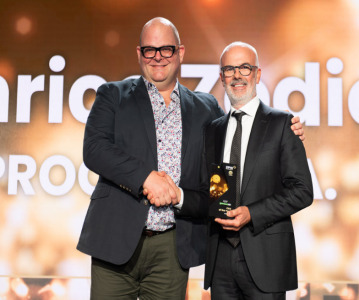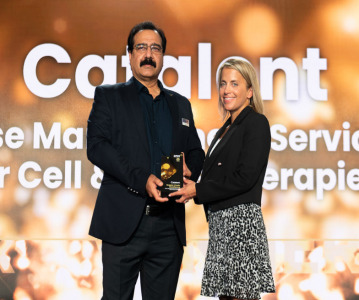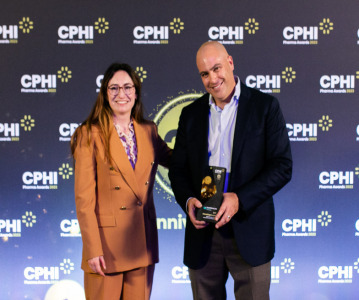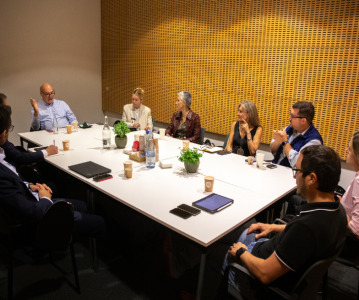CPHI Barcelona 2023: Tackling the Pharma Talent Precipice – Part 1
.png)
This year at CPHI Barcelona (24–26 October, 2023) we sat down with C-suite executives and HR professionals to discuss the looming talent crisis in the pharmaceutical industry. With hybrid working persisting post-pandemic and a growing skills gap, how can the pharmaceutical supply chain adjust to a changing labour force?
Thank you to our experts!
Namrata Gill, VP Human Resources, Dr. Reddy’s Laboratories
Bobby Sheng, Chairman and CEO, Bora Pharmaceuticals
Pierre Luzeau, President and CEO, Seqens
This article was conducted in partnership with Neil Kelly, CEO & Founder of Talent Sandbox and Vector Partners:
"Expert Talent Overview - Thank you for Informa and Vivian for the great partnership on this series of interviews on talent in the CDMO market. Our mission as Vector is to drive a better quality of conversation with senior leaders within the CDMO market. With the evidence based on these interviews, we have some highly engaged business leaders, vested to leave the industry in a better shape than they found it. Although we are still missing some key strategic direction for a broader market wide solutions to solve some of the systemic talent gaps that we continue to see. We look forward to continue driving this conversation into the next year around talent, with this series demonstrating that appetite for solutions and collaboration."
- Neil Kelly
In your role, how do you currently prioritise talent as one of your strategic objectives? Has the focus shifted or evolved over recent years?
Gill: I think some things have changed while others haven’t. One of things that has changed is an emphasis on digitalisation. Internally, we have a programme called Digital Ninja. This programme had a lot of pull, with around 3000–5000 ‘Digital Ninjas’ in the organisation. This is something that I think has helped us keep pace with talent.
As a strategy at Dr. REddy's, we are both in the generics and innovative space. Internally, we call the innovative space Horizon II, where we are building different capabilities e.g. for nutrition, a CMDO for biosimilars, digital therapeutics etc. Broadening our capabilities allows us to attract the talent that we need. We also focus on learning agility. I believe people can adapt and learn quickly.
Sheng: From our company, we’ve probably doubled every 2 years – so talent has become extremely important. Especially at director-level talent, VP-level talent, these have become a focal point for me because that’s what you need to grow the company. As the company grows, authority delegation and the quality of the leadership team you have is a high priority, to the extent where my biggest hire this year was my Chief HR Officer. We put a lot of resources into interviewing correctly with a rigorous interview process and a clear definition of the talent we want and need. So yes, I would say the top priority for the company – not even second, or third – is more talent.
Luzeau: To give a broad view of our business, hiring in pharma and talent attraction is essential. We are an attractive industry – we project a positive image related to health in everyone’s life. But the competition is fierce among the companies trying to attract talent. It’s a business in which we have a shortage of skills. There are some areas where that’s more difficult such as quality assurance, business development maintenance etc. And it is worldwide, especially in Europe and the US.
If you want the best talent, you need to really invest in not only attracting them but also keeping them on board.
What is the one skill or competence, that you most value as a business leader?
Gill: For me, it’s learning agility. You have to stay relevant in your knowledge and skills. Digital literacy is also a top priority. There’s no reason why somebody can’t learn to use new technologies. Then there’s leadership and helping others to develop. Development is paramount to building your teams.
Sheng: It’s hard to say but I would say there are three.
- Teamwork and building great teams is one – can this person be part of a great team?
- Leadership through adversity. Can this person lead through changes and challenges?
- Results-oriented. The first two are important but you can prioritise the first two and not deliver results. Alternatively, will this person start running through others to get the results? A combination of the three are equally as important.
Luzeau: With a lack of talent in certain areas, we really value those who understand GMP, automated systems, and now, for our industry, the field of chemistry. We really need well-trained people in these areas, with a combination of good academic learning but also internal training to adapt to new technologies.
With new technologies and the digitalisation of the pharmaceutical supply chain, it is estimated that in the next decade over 90,000 pharmaceutical jobs will disappear and be replaced by up to 120,000 new roles, with a growing skills gap. How is your board looking to address this? Do you see a broader role for the pharmaceutical industry in tackling this together (if at all)?
Gill: As we are part of a larger pharmaceutical company, everybody is part of a skilling council that formulates skill strategies. We do something called workforce planning, where we plan for the future on five to six core capabilities that we will need 3 years from now. For example, CAR-T specialists are in high demand right now. The questions we ask are how do you make sure these professionals are available? What are the things you need to do now? Even if they are not experts, how many people will have a working knowledge that will be available in the future? One thing that is happening a lot is unconventional skilling sources. There are organisations that take underprivileged graduates and train them. We also have an assembly training HI programme for manufacturing. We approach high school students in India and put them into graduation while training them to get ready for doctoral studies.
These multi-pronged strategies are essential because technology is changing so fast. We are also specialising in customer experience and employee experience – in the end, technology has to lead to some benefit to the end-user. We focus on developing the expertise to constantly enhance customer or patient experiences.
Sheng: As we’re seeing a new phase of different job markets in general, I don’t think we will see an uptick in unemployment for a long time. There’s different definitions of employment now. For a lack of a better term, there’s different ways to make money. Is a freelancer employed or unemployed?
Overall, for the pharma industry, I see two important things for us. One is automation. At the site level, there may be less roles available – for the last 20 years, inflation has outpaced salaries for the manufacturing side of the industry. What’s happened then is we have gotten away with robotics, automation, and continuous manufacturing to meet operational standards, while throwing people where we need them in the moment. But we haven’t looked at how we can improve these processes efficiently. So I think there’s going to be a huge amount of investment in automation but it’s not to eliminate jobs – it's to put robots where people don’t want to be. So on the manufacturing side, we’re just filling the roles that need to be filled as supply is increased to meet demand for a product. These roles will be filled with more efficiency and this is where automation comes in. Additionally, on the management side, we need to be able to leverage our time and resources with technology. How do you use messaging and teams and remote working more efficiently? We’re spending more time off-site so leveraging our resources to accomplish more will be equally as important.
Regarding collaboration, the industry is quite small so what one person does, I think most will start doing. I don’t know if there’s a whole industry wide trend that needs to be led but it will grow. With the increase in new drug discoveries that are happening, and the changing demographics, there’s going to be a continued increase in demand. But the labour force is completely changing so I think everyone will need to adjust their labour force and their people. I don’t know that the industry needs to force about a change, it’ll just happen.
Luzeau: Addressing the skills gap, we hire externally – this is obvious. But we prefer to train people and try to promote internally. The transferability of skills across enterprise functions is also a priority, and we provide training to allow employees to move from one position to another. We offer company-wide training programmes on regulatory affairs, and quality validation, which are very complex fields with stringent requirements from health authorities. That’s another way we address skill gaps in employees.
Finally, for business development, we have some internal training programmes for procurement teams and for commercial teams in order to explain and be the face of our company, especially in matters concerning technology. It’s important to have regular training throughout your career and we spend a lot of time investing in these programmes.
What are some of the approaches that you have adopted/implemented as an organisation to ensure they you meet business and operational demands with the right talent?
Gill: We are making skills a currency. In traditional organisations, the structure is very role-based. For the future, we are moving away from these role bands – if you upskill, you will progress. This incentivises horizontal movement. Normally, promotions are incentivised in an organisation. We’ve elimated these designations internally, removing the symbol of hierarchy. In the absence of hierarchy, your currency becomes skills. Incentivising horizontal movement as much as vertical movement helps distribute the experiences and vital expertise you need in your organisation.
We also look at unconventional career sources for talent, such as gig workers, part-time workers, internships etc. We have a big programme for career comebacks for women. Giving these employees flexibility such as career breaks and remote working can create that extra talent pool in the long-term. The selection of talent and the talent you hire also promotes your company culture with the evolution of new roles. For example, before we did not have a Digital Translator. Now, I have a person in manufacturing translating what the manufacturing process needs from digital processes. Sometimes, in regulatory, we also need a digital translator to transform the whole business. The role is constantly evolving, which helps a lot of people in reskilling and upskilling within the company. This also helps us in our strategy for retaining talent. We also prioritise the accessibility of talent. We have a lot of remote and hybrid working models to access broader talent worldwide, going outside the traditional boundaries of geography.
We also prioritise collaboration with academic institutes, especially in India where we are based. We do internships, joint research, industry-specific courses, and more with academia. These translate over to lifelong learning programmes, supporting employees at all career stages. For us as a company, there’s also an aspect of financial incentives for employees gaining new skills, incubating cross-functional learning across the company, which offers our talents opportunities to grow within the company.
Sheng: For us, it’s a redefinition of what HR means. In a lot of organisations, HR is just payroll, hiring, firing, or recruiting. We’ve defined HR as people management. Are the right people in the right places? Are they being trained correctly? We’re spending a lot more time training people to do what we expect them to do as opposed to expecting them just to do it. Making sure that they’re efficient in what they do, that they communicate exactly what they need, and that they continue to grow in that job and continue to contribute to the company as they grow. Redefining the importance of talent in a company has been huge for us. It’s a matter of refocusing the roles of what HR is supposed to do, and make them responsible for Talent Development, making them responsible for somebody not performing their role. It’s an HR manager’s ability to communicate with them, learn what is happening, and how to improve how this person is performing. Firing and hiring often costs so much more than possible re-training or re-allocating this person to the right role.
It’s also defining how you hire the right people. To clearly define what your company culture is, and to communicate that to the potential employee coming into your company. Do they understand what that really means? On top of this, going from hiring to the onboarding process, we have a cultural mentor for new hires. Not just a mentor on job function but also what the company culture is like. If an organisation does these things, there’s higher job satisfaction and the company processes are more efficient, with employees being onboarded faster and staying longer.
How do you see skills evolving in the Pharma industry? Since skills development and recruitment often work hand-in-hand, what are some key learnings when managing a Global workforce?
Gill: Dr. Reddy’s talent management and talent acquisition is a single function. Incentivising skill development through horizontal movement helps with upskilling. We have increased the number of internal certifications we do and while it’s still a work in progress, I think we are on the right track.
You also have to bring the whole company culture together behind skill building. Are your leaders themselves developing skills? Are they taking on these certifications? We’re all in this together. We lead a cultural change with something called Propel Week, wherein we promote skill development. We also implement an agile culture experimenting with different ways of working.
We also have a lot of mentors for career discussions and skill development. Interlinking skills with careers helps to incentivise horizontal movement, as mentioned. Learning is not limited to just training, but also an on-the-job experience. People can choose to work on a project and see what the impact will be.
Sheng: I think education is changing too. The importance of college, I think, is that it’s a great place to grow up. Is it the end-all of what you’re learning? No. You’re constantly learning. Skills are obviously very important, but you can teach those skills, even on the job. You can have your background and your foundation taught at university, but there’s so many more tools out there. Online learning, education on the job. There’s a constant learning of different skills at different times. For example, human communication is a skill. Delegating authority is a skill. There are definitely technical skills that are required but I think managerial skill sets on how to manage the technical side of things are all skills.
Luzeau: We create strong links with universities and research centres that bring in a bracketed volume of new talent. Going forward, we provide these talents with on-site training and create connections with them as they continue in their careers. By going to these universities and schools in pharma, we also increase our visibility and reputation. So it has a double effect – not only can you hire, you also promote your company.
We also try to set up specific partnering programmes and coaching to students, financing PhD theses, and internship training. So far, we have approximately 200 Young Technical Trainees each year where 15–20% of them are hired afterwards.
With Pharma sites sitting in increasingly remote locations to keep costs down or for legacy reasons, how do you see the talent landscape evolving and how will this impact talent mobility?
Gill: We already see some major pharma hubs such as Basel, Boston, San Francisco etc. But new hubs are constantly evolving, especially in the East (Japan, China, Korea etc.) The hubs are typically focused on innovation and R&D, and the factories and manufacturers of the future will need to stay strongly interconnected. While location is an important aspect, technology such as remote working is more and more able to bridge it.
Sheng: I think working from home allows smaller companies like us access better talent. There’s no way I would have a Swiss Head of HR if I didn’t have all these new technologies that allow people to work remotely and be effective and efficient. Location of a certain site or operations matters less. At the same time, with manufacturing, there has to be some presence on-site to monitor. If it hasn’t already, I do think working from home will revert to a sort of hybrid working, and location will still be as important as before. What I’m seeing now is quality of life and tax reasons. It’s why everybody is moving out of California and into Texas and Phoenix. Biotech hubs like San Diego are always going to have some talent there – there's always labs that need people – but I think if you can do remote, it frees up some of the location barriers for talent.
Luzeau: For us, the answer is to be closer to these hubs. For example, we have CRO activities in Boston because it’s versatile. You need to be where your customers are. In terms of manufacturing, it can be an issue where a plant cannot be set-up in an expensive location.
The best way forward in this case is to build partnerships with schools and universities. It needs to be an investment in both the company and employee careers. Pharma itself is attractive from a salary standpoint – we do pay very well relative to other activities in certain fields of study.
What areas of the pharmaceutical supply chain will see the most movement of talent and why?
Gill: I think we will see a lot of movement in the area of data analytics. Data scientists, data analytics, digital and artificial intelligence – these are all areas where we’ll see a shift.
The other part of the industry that might see a shift is digital supply chain management. The supply chain is key because at the end of it, there’s a patient who needs the medicine. So, there’s always questions about efficiency and transparency, which digitalisation of certain processes can make clearer.
Thirdly, I think we’ll see a larger scope of roles for regulatory and compliance. Regulatory assurance and compliance must keep pace as supply chains become more complex with digitalisation and new technologies. They are critical in how the global supply chain works together and meets global standards.
Sheng: I wouldn’t say AI is going to affect a lot of logistics because that’s just about knowing where the drugs need to go and how. I think AI is going to completely change R&D with the gathering data, analysing and publishing it – there's going to be so much more development in that area. The jobs in those areas will still be there, but they’ll be repurposed. If you imagine a doctor that has the records of over 3 million leukaemia patients, they can answer what kind of drug–drug interactions they have, if their heart rate or blood pressure is suitable for a certain drug etc. Instead of seeing five specialists over a year, one doctor can have the data to make those decisions. That’s just one example of AI – so I think those jobs are for sure going to change.
Luzeau: We do have issues but they are not specific to pharma. People going into a digital world do lack skills. This is one area where there will be a lot of movement because of this skill gap. The second area that will see some change is quality and regulatory affairs. It’s difficult to find a pool of talent in regulatory affairs so the competition for this talent is high. Realistically, it’s not that attractive of a field. It’s a job with structure and very rigorous procedures. Finding good people in this area is becoming more and more difficult. Many companies also try to avoid people leaving the company in this field because the training so long and so specific.
To read more about talent acquisition and reskilling in the pharmaceutical industry, check out our Feature Article on recruitment and talent retention.



Related News
-
News CPHI Pharma Awards 2023 – Sustainability winners: Schneider Electric
After another year of impressive nominations for the CPHI Pharma Awards our winners were announced at CPHI Barcelona in October 2023. In this series of interviews, we speak to the people and teams behind the award-winning projects, concepts, and techno... -
News CPHI Pharma Awards 2023 – At the Heart of Pharma winners: Merck KGaA
After another year of impressive nominations for the CPHI Pharma Awards our winners were announced at CPHI Barcelona in October 2023. In this series of interviews, we speak to the people and teams behind the award-winning projects, concepts, and techno... -
News CPHI Pharma Awards 2023 – Packaging & Machinery Winner: Gasporox
After another year of impressive nominations for the CPHI Pharma Awards our winners were announced at CPHI Barcelona in October 2023. In this series of interviews, we speak to the people and teams behind the award-winning projects, concepts, and techno... -
News CPHI Pharma Awards 2023 – CEO of the Year Winner: Enrico Zodio, PROCOS S.P.A.
After another year of impressive nominations for the CPHI Pharma Awards our winners were announced at CPHI Barcelona in October 2023. In this series of interviews, we speak to the people and teams behind the award-winning projects, concepts, technologi... -
News CPHI Pharma Awards 2023 – Supply Chain Excellence Winners: Catalent Case Management Services
After another year of impressive nominations for the CPHI Pharma Awards our winners were announced at CPHI Barcelona in October. In this series of interviews, we speak to the people and teams behind the award-winning projects, concepts, and technologie... -
News CPHI Pharma Awards 2023 – API Development and Innovation Winners: Snapdragon Chemistry, a Cambrex Company
After another year of impressive nominations for the CPHI Pharma Awards our winners were announced at CPHI Barcelona in October. In this series of interviews, we speak to the teams behind the award-winning projects, concepts, and technologies. -
News Navigating the Future: Challenges and Opportunities in Pharma Innovation and Investment – CPHI Barcelona 2023 Roundtable Report
In this comprehensive downloadable report, hear from a range of experts in finance and investment in the pharma industry on what investment trends will be shaping the future of the industry, in Catalonia, and the wider world. -
News CPHI Barcelona: Outsourcing in Manufacturing Operations
During CPHI Barcelona 2023, insightful content sessions offered attendees the chance to explore trending topics with expert speakers and panellists. Here, we summarise what the pharma industry and supply chain are talking about the most.
Position your company at the heart of the global Pharma industry with a CPHI Online membership
-
Your products and solutions visible to thousands of visitors within the largest Pharma marketplace
-
Generate high-quality, engaged leads for your business, all year round
-
Promote your business as the industry’s thought-leader by hosting your reports, brochures and videos within your profile
-
Your company’s profile boosted at all participating CPHI events
-
An easy-to-use platform with a detailed dashboard showing your leads and performance

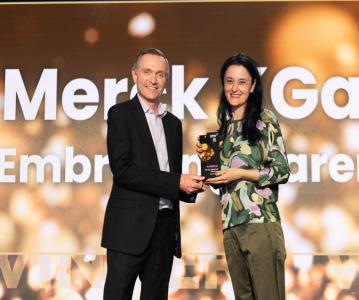
.png)
